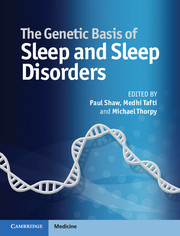Book contents
- The Genetic Basis of Sleep and Sleep Disorders
- The Genetic Basis of Sleep and Sleep Disorders
- Copyright page
- Contents
- Foreword
- Preface
- Contributors
- Abbreviations
- Section 1 Generalprinciples of genetics and genomics
- Section 2 Geneticsof sleep and circadian rhythms
- Section 3 Sleepphysiology and homeostasis
- Section 4 Insomnias
- Section 5 Narcolepsyand hypersomnias
- Chapter 23 HLA and narcolepsy
- Chapter 24 Orexin (hypocretin)and narcolepsy
- Chapter 25 Genome-wideassociation studies in narcolepsy
- Chapter 26 Genetic disorders producing symptomatic narcolepsy
- Chapter 27 Genetics of recurrent hypersomnia
- Section 6 Sleep-related breathing disorders
- Section 7 Circadian rhythm sleep disorders
- Section 8 Parasomniasand sleep-related movement disorders
- Section 9 Psychiatricand medical disorders
- Section 10 Medication effects
- Index
Chapter 27 - Genetics of recurrent hypersomnia
from Section 5 - Narcolepsyand hypersomnias
Published online by Cambridge University Press: 05 November 2013
- The Genetic Basis of Sleep and Sleep Disorders
- The Genetic Basis of Sleep and Sleep Disorders
- Copyright page
- Contents
- Foreword
- Preface
- Contributors
- Abbreviations
- Section 1 Generalprinciples of genetics and genomics
- Section 2 Geneticsof sleep and circadian rhythms
- Section 3 Sleepphysiology and homeostasis
- Section 4 Insomnias
- Section 5 Narcolepsyand hypersomnias
- Chapter 23 HLA and narcolepsy
- Chapter 24 Orexin (hypocretin)and narcolepsy
- Chapter 25 Genome-wideassociation studies in narcolepsy
- Chapter 26 Genetic disorders producing symptomatic narcolepsy
- Chapter 27 Genetics of recurrent hypersomnia
- Section 6 Sleep-related breathing disorders
- Section 7 Circadian rhythm sleep disorders
- Section 8 Parasomniasand sleep-related movement disorders
- Section 9 Psychiatricand medical disorders
- Section 10 Medication effects
- Index
Summary
Keywords
- Type
- Chapter
- Information
- The Genetic Basis of Sleep and Sleep Disorders , pp. 272 - 278Publisher: Cambridge University PressPrint publication year: 2013
- 2
- Cited by



